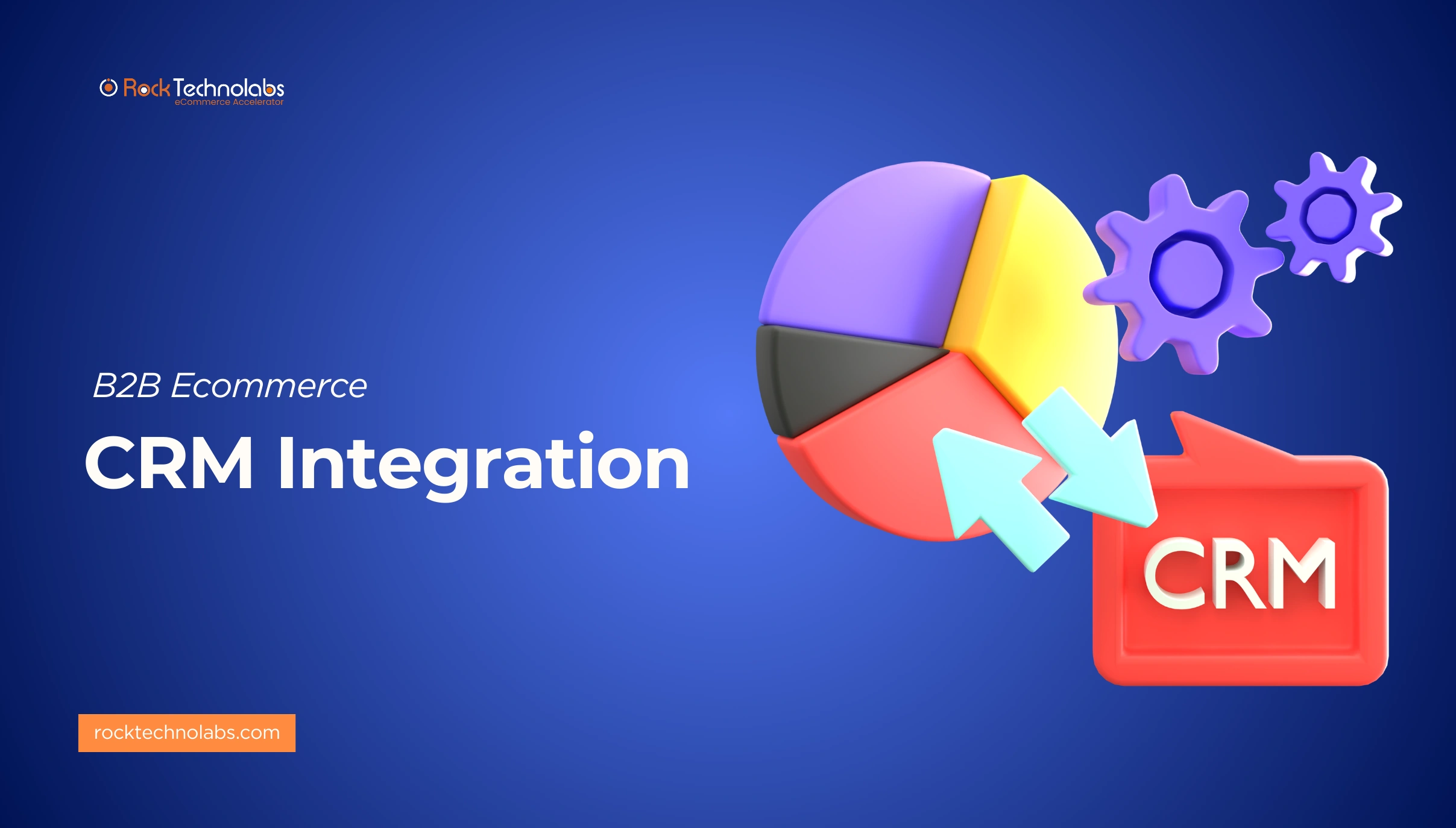The rise of digital commerce, driven by players such as eBay and Amazon, has revolutionized how companies engage with each other, especially in the B2B sector.
Sales in the B2B area are more perplexing than in B2C. Buying cycles take a longer time, and organizations are focused on a more modest crowd.
There are no feeling-driven deals in B2B, just reasonable and well-planned sales. Smooth customer relationship management is no longer a comfort – it’s a requirement for companies that want to remain competitive.
As B2B digitalization gains pace, businesses have to deal with complicated relationships among manufacturers, distributors, wholesalers, and retailers.
Businesses now expect personalized experiences, real time insights, and streamlined interactions – challenges that traditional relationship management methods can’t effectively handle.
Companies that adopted B2B CRM solutions succeeded by leveraging automation, data driven insights, and integrated platforms to maintain strong client relationships even during uncertainty.
B2B ecommerce CRM integration is an important approach that facilitates companies to link their customer relationship management systems to their ecommerce websites.
The integration provides smooth data synchronization, enhances customer interactions, and maximizes business operations.
13% of organizations report that spending on a CRM platform is among their top sales initiatives.
This guide explores:
- Overview
- Benefits of B2B CRM integration
- Challenges
- Tips for Successful B2B CRM Integration
- Key features
Overview – B2B eCommerce CRM Integration
B2B eCommerce CRM integration stands for business-to-business customer relationship management and is used to describe systems, technologies, methods, and processes used by companies to assist with managing business relationships with existing and future business customers.
A properly integrated CRM solution will also allow you to track the results of B2B marketing campaigns, manage customer data, identify where the highest qualified leads originate, track interactions, and automate sales processes.
Some of the most commonly used B2B CRM software include:
- Salesforce B2B CRM
- HubSpot CRM for eCommerce
- Zoho CRM B2B
- Microsoft Dynamics CRM
- SAP CRM for eCommerce
There are many examples of B2B CRM applications across different industries, including:
- A SaaS company using B2B CRM to track interactions with enterprise clients, manage subscriptions, and provide personalized customer support.
- A manufacturing company leveraging CRM to manage relationships with suppliers, distributors, and bulk buyers while streamlining order management.
- A wholesale distributor implementing CRM to track purchase history, predict customer demand, and improve retention strategies.
- A marketing agency utilizing CRM to handle multiple client accounts, track project progress, and personalize communication.
- A logistics provider using CRM to manage client contracts, track shipments, and enhance customer service.
- A B2B ecommerce platform integrating CRM to automate follow ups and to optimize sales processes.
These are just a few B2B CRM examples, but there are many more depending on the industry and type of business.
Recommended Reading: B2B ecommerce website examples
Benefits of CRM and eCommerce Integration
1. Centralized Customer Data Management
Integrating a Customer Relationship Management (CRM) system with an eCommerce platform enables companies to collect all customer data – interactions, purchase history, preferences, and contact information – into a single, unified system.
Advantages:
- Eliminates fragmentation of data by storing customer information in one location.
- Improves decision making through complete details of customer activity.
- Facilitates personalized marketing by offering promotions and communications based on past data.
- Saves administrative time by synchronizing customer information between sales, support, and marketing departments.
2. Improved Customer Experience
A B2B CRM solution enables companies to monitor customer activity, buying habits, and interests, which enables them to provide a very personalized shopping experience.
Benefits:
- Personalized Product Suggestions: From browsing history and previous purchases.
- Personalized Interactions: Sales and support staff can interact with customers through personalized messages.
- Quicker Response Times: CRM automation enables prompt query resolution and follow-ups.
- Personalized Discounts & Offers: Segmentation-based pricing tailored to the customer.
- Proactive Customer Care: Predict customer needs even before they pose a query. Having visibility into an entire customer history equips sales teams to forge better relationships, eventually leading to improved loyalty and lifetime value.
3. Data Driven Marketing Strategies
An integrated ecommerce CRM allows companies to use customer data for highly targeted marketing ads, resulting in higher engagement and conversion rates.
How It Works:
- Customer Segmentation: Segment customers by demographics, buying patterns, and tastes.
- Advanced Analytics: Make predictions about buying patterns and plan future buying behavior.
- Marketing: Monitor interactions from email, social media, SMS, and website visits to fine tune campaigns.
- Retargeting & Upselling: Leverage a history of previous purchases to suggest appropriate products.
By using advanced analytics, businesses can enhance marketing campaigns with more return on investment and enhanced customer loyalty.
Further Reading: B2B Ecommerce Strategy: Complete Guide + Best Practices
4. Enhanced Data Quality and Consistency
The merging of CRM with eCommerce, marketing, and stock systems provides simultaneous data synchronization for all platforms.
Key Benefits:
- Breaks Data Silos: Ensures every team (sales, marketing, support) deals with the same current information.
- Reduces Duplicate Records: Reduces errors through obsolete or duplicated customer data.
- Analytics for Decision Making: Aids businesses in forecasting demand, identifying risks of churn, and optimizing pricing approaches.
5. Improved Marketing Return of Interest
With CRM integration, marketing professionals can map and monitor customer touchpoints, ensuring balance between sales and marketing.
Main Benefits:
- Targeted Ads: Reach the right message to the right customer at the right moment.
- Personalized Content & Offers: Increase engagement with active email campaigns and personalized product suggestions.
- Marketing Automation: Automate email sequences, social media contacts, and follow ups based on customer behavior.
- Attribute Tracking: Identify which marketing channels yield the highest conversions.
Challenges of B2B CRM Integration
While B2B customer relationship management integration offers numerous advantages, businesses may encounter some challenges, including:
- Data Silos: Migrating data from legacy systems to a new B2B CRM system can be complex.
- Customization Needs: Not all CRM solutions fit every business model, requiring customization for optimal performance.
- Cost and Implementation Time: High end B2B CRM software solutions may require significant investment and time for deployment.
- User Adoption: Training employees to use a new CRM and eCommerce solution effectively can be a hurdle.
Read More: 10 B2B Ecommerce Challenges (And Their Solutions)
Tips for Successful B2B CRM Integration
1. Define Clear Goals
Before implementing your CRM, define particular business objectives, like enhancing sales effectiveness, better customer service, or marketing campaigns.
2. Select the Proper CRM Platform
Make sure your CRM can integrate with your current tools. Tools such as Salesforce, and Microsoft Dynamics have strong integration capabilities.
3. Use Scalable and Flexible Solutions
Choose integration solutions that are capable of growing along with your company. Cloud based solutions tend to provide greater flexibility and easier support.
4. Maintain Data Cleanliness
Clean up your current data before integration to eliminate duplicates, old records, and errors.
5. Implement API First Approach
APIs facilitate smooth exchange of data between systems. Choose CRM solutions that have strong API support to make integration easier.
6. Implement Workflows Automation
Implement automated triggers on regular tasks such as follow ups, data entry, and assigning leads to maximize productivity.
7. Track and Optimize Performance
Regularly monitor integration performance, fix problems, and optimize processes to enhance efficiency.
8. Train Your Team
Offer hands-on training and assistance to enable employees to utilize the integrated system effectively.
Key Features of a B2B CRM System
When selecting the best CRM for B2B, look for these essential features:
1. Centralized Customer Database
Consider your CRM as the system of record for all customer information.
It holds everything from company and contact details to historical interactions, deals, and purchase history, so that your teams can get the correct information when they need it.
Why it matters: No more running through emails or spreadsheets. Everyone in your company stays on the same page, leading to better communication and stronger client relationships.
2. Lead and Opportunity Management
Not all leads are ready to purchase today. A B2B CRM assists in tracking leads, scoring them by engagement, and nudging them along the sales pipeline.
It also enables you to keep tabs on sales opportunities so no prospect deal falls through the cracks.
Why it matters: You’ll prioritize the right prospects, follow up at the perfect time, and increase your chances of closing deals.
3. Sales Pipeline Management
A visual sales pipeline allows you to monitor all deals in progress, from initial contact to the signing of the final document.
You can create custom sales stages, assign tasks, and advance deals with ease.
Why it matters: A clear pipeline view helps sales teams stay organized, bold, and focused on closing deals faster.
4. Task and Workflow Automation
B2B sales have a lot of follow ups, emails, and document management.
With automation powers, your CRM can send reminders, follow up emails, and even initiate actions based on customer activity.
Why it matters: Less manual work means more time for building relationships and closing sales.
Plus, it reduces the risk of forgetting an important follow up.
5. Integration with Other Business Tools
A powerful B2B CRM should seamlessly connect with other key systems like:
- ERP software: Sync order history and inventory.
- Marketing automation tools: Align sales and marketing efforts.
- Ecommerce platforms: Track online sales and customer behavior.
- Customer support systems: Provide a 360-degree view of customer interactions.
Why it matters: No more jumping between platforms; your CRM brings everything together for a unified workflow.
Related Read: B2B Ecommerce ERP Integration: Ultimate Guide
6. Advanced Reporting and Analytics
Your CRM should provide real time insights on sales performance, customer behavior, and marketing effectiveness.
Customizable dashboards and reports help you track:
- Sales trends
- Lead conversion rates
- Customer lifetime value (CLV)
- Marketing campaign success
Why it matters: Data driven decisions lead to smarter strategies and better business growth.
7. Role Based Access and Permissions
Not all employees in your business need to see the same information.
A B2B CRM allows you to decide who can view, edit, or manage particular customer data based on roles.
Why it matters: It safeguards sensitive business data and keeps teams productive and concentrated on their work.
8. Multi Channel Communication Tracking
B2B relationships entail emails, calls, video conferences, and even social media exchanges.
Your CRM should record all touchpoints, providing you with a complete history of customer interaction.
Why it matters: Sales and support teams never have to play catch-up or guess at why they are reaching out, which results in more meaningful conversations.
9. Mobile Accessibility
Your sales team isn’t always at their desk. A mobile-friendly CRM ensures they can access client details, update deal statuses, and respond to leads on the go.
Why it matters: Sales never stop, and neither should your ability to manage customer relationships.
Final Thoughts
And there you have it – a thorough (but hopefully engaging) look at how B2B ecommerce CRM integration is changing the face of sales.
If you’ve reached this point, we salute your commitment. There’s a reason we keep saying it: Technology should empower your business, not hinder it.
B2B eCommerce CRM integration captures this maxim by freeing sales teams from the work of manual data entry, allowing them to devote their energies where they excel best: cultivating meaningful relationships with clients.
Whether you’re a startup looking to shake things up or a well established enterprise hoping to innovate your sales model, the opportunities are immense—and increasing. We at Rock Technolabs are thrilled to be among the leading-edge companies taking charge, with our personalized B2B ecommerce solutions and CRM integration services setting new benchmarks in innovation.
Until then, may your sales pipelines be ever-flowing, your customer relationships ever-strong, and your business keep growing in the digital age.
Thanks for taking this ride with us—and remember, the future of B2B sales is integrated.










